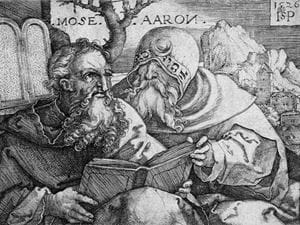
Who is the most influential prophet in the Bible? That is the sort of question that sends scholars running because there are too many good arguments for too many different prophets. A number of them could take home the prize, but here are a few that would make just about everyone’s shortlist.
Given that the Bible is stuffed full of prophets, they are, obviously, not all included on this list. The prophets here, however, are not limited simply to those who have books named after them. Instead, anyone who received a revelation from God that in some way changed or heavily influenced their life and future counts as a prophet. Jesus, however, is notably not mentioned. It seems rather unfair to pit the influence of the Son of God against mere mortals. So, of those mere mortals, who would take home the crown?
Abraham
Abraham’s name may not come up in conversations about the Bible as much as people like Moses or Jesus, but there is no doubting Abraham was an essential part of the biblical story. Without him, there would not have been a story at all. Without Abraham, there is no Isaac. Without Isaac, there is no Jacob. Without Jacob, the Tribes of Israel never exist. This would mean no Moses, no David, no Solomon, no Daniel and eventually, no Jesus.
In addition to being, through his grandson, “the father of many,” Abraham was the recipient of the first covenant. God’s promise was first made to Abraham, and much of the remainder of the Old Testament is filled with how that promise comes to fruition. Without Abraham, the original covenant would not exist. That makes this often-sidelined character awfully influential in the overarching narrative.
Joseph, Son of Israel
There are an awful lot of Johns, Josephs and Marys in the Bible. Most of them also happen to be quite important to the overall story. Joseph, son of Israel, is no different. He is one of the better known characters in the Old Testament, but his influence on the rest of the story is sometimes forgotten. People seem to be under the mistaken impression that Joseph’s part in the story comes to an end with the conclusion of Genesis. His choices in Genesis, however, drive the rest of the biblical story. Joseph’s actions in Genesis save Egypt and later his family from famine. As a result, the descendants of Jacob proliferate and remain in Egypt. They are then oppressed, enslaved and eventually led to Israel via a miracle at the Red Sea. Had Joseph not been in Egypt and not saved its people from famine, the sons of Israel would have starved in Canaan. Even if they had not died out entirely, it is likely their numbers would have been greatly reduced. They would also never have gone through the Exodus. Without Joseph, the Bible only would be one book long.
Moses
Moses is arguably the best known character from the Old Testament. His story certainly gets more attention than most. The tale of the Exodus also forms the backbone for the next several thousand years of Jewish faith. Without Moses, none of this would have occurred. The Israelites would still be enslaved in Egypt and might have been absorbed into Egyptian society rather than managing to maintain their own culture and language. This would have meant that there was no return to the Promised Land, no Israelite kingdom and no New Testament.
In addition to being the leader of the Exodus, Moses was also the one who received and passed on the rules and revelations that would become the Jewish Law. The Israelites’ successes and failures to adhere to these laws comprise the vast majority of the Old Testament. The laws also shape the way people in the New Testament think and act. The Mosaic Laws also helped the Jews to maintain a cultural identity despite being scattered across the world and persecuted for centuries. To this day, Moses’ law remains a cornerstone in Jewish culture, faith and identity.
Isaiah
Isaiah is probably the first person many people think of when they are asked about the prophets of the Old Testament. He almost certainly tops the list when that question is asked of Christians. After all, Isaiah’s prophecies are by far the most oft-quoted ones in the New Testament. Isaiah’s influence, however, was not limited to his predictions of Christ’s coming. He was also indispensable to people in his own time. During Isaiah’s lifetime, the Sennacherib led the Assyrians in their invasion of Israel. The Assyrians were famous for their brutality toward the people they conquered. When facing the Assyrian army, it was often better to fall in battle than face their nonexistent mercies when the fight was over. Conquered captives faced an orgy of agony that included tortures such as being skinned alive, impalement and dismemberment. When the Assyrians marched on Israel, Isaiah counseled Hezekiah on how to proceed. Isaiah’s advice was not enough to save Lachish, Israel’s second greatest city, but it did manage to keep Jerusalem from falling into Assyrian hands.
John the Baptist
John the Baptist has elements of both a New Testament prophet and an Old Testament prophet. He, in many ways, follows the style of a prophet from the Old Testament. He lives somewhat outside of society but remains deeply respected by so many people that he cannot truly be considered an outsider. At the same time, his message differs greatly from the Old Testament prophets. His message focuses on the coming of the Messiah and dangers to the soul, not physical manifestations of God’s wrath such as invading armies. As such, John represents the transition from a world governed by the old covenant to one ruled by the new.
In his time, John played an essential role in preparing the world for the coming of Jesus. In addition to encouraging a new wave of Jewish convictions and faith, he was also the one who baptized Jesus Himself.
Deciding who the most influential prophet was in the Bible is exhausting. Every named character has been remembered through the millennia for a reason. As such, it is difficult to say for certain who had the greatest impact. All of them shaped the future for thousands of years to come, and all of them will continue to do so for centuries after this. When it really comes down to it, who can measure the impact a butterfly’s wings will have?

